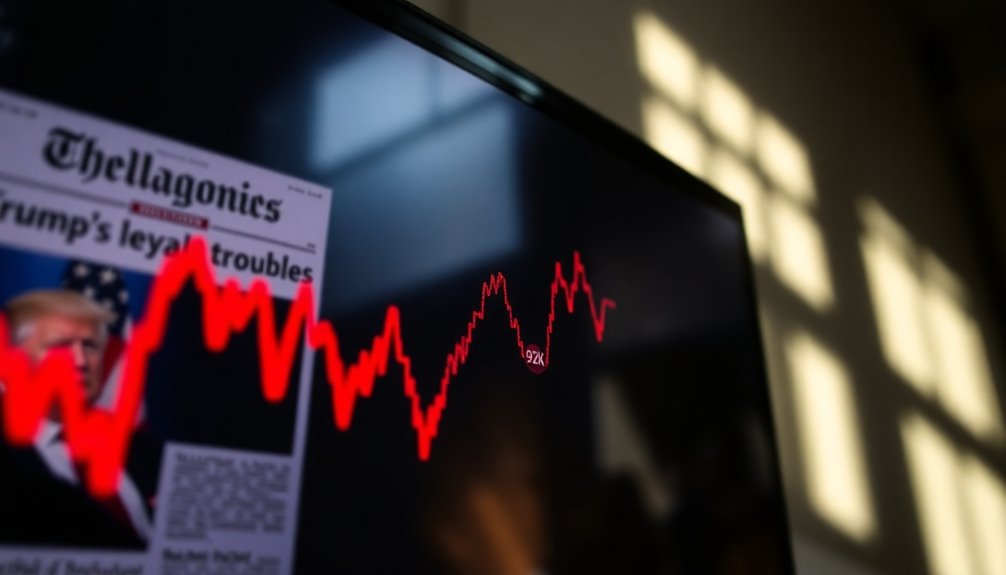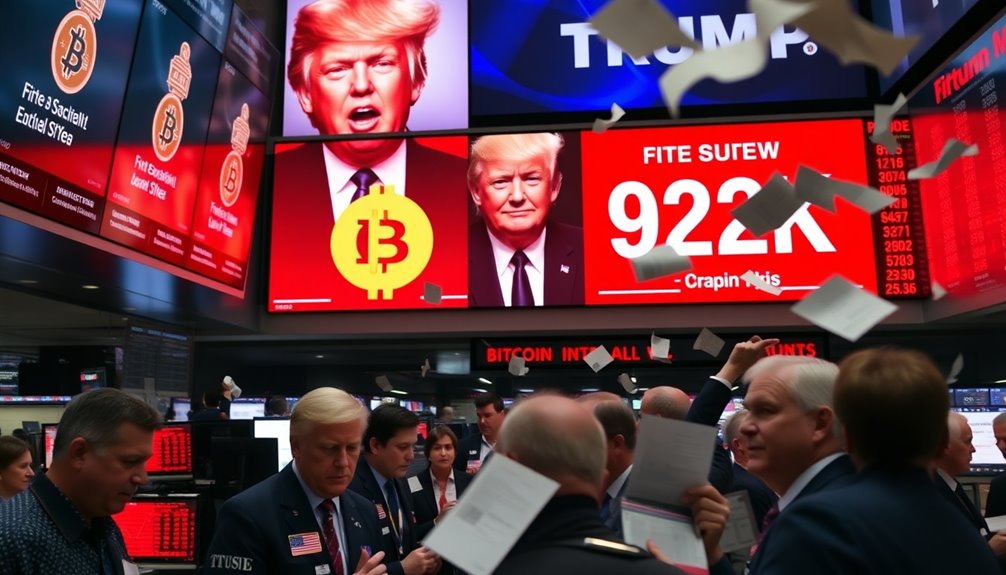Bitcoin's recent dip below $92,000 shows how quickly market sentiment can change. After an initial surge fueled by optimism around Trump's potential crypto policies, confidence has begun to wane. While many investors once viewed Bitcoin as a hedge against economic unpredictability, Trump's ongoing legal challenges complicate the landscape. Factors like rising inflation and uncertainty in global markets are adding to the volatility. Corporate interest in Bitcoin remains strong, but the current environment leaves questions on future stability. To get a clearer picture of what's next for Bitcoin, you might want to explore more about the driving forces behind these fluctuations.
Key Takeaways
- Bitcoin fell below $92,000 after an initial surge past $100,000 following Trump's election, reflecting market volatility.
- Investor optimism was driven by anticipated favorable cryptocurrency policies under Trump, but uncertainty remains due to his legal troubles.
- Chief economists predict a global economic downturn by 2025, impacting overall market confidence and Bitcoin's performance.
- Corporate adoption of Bitcoin is increasing, with companies like MicroStrategy and Block Inc. investing heavily to enhance financial stability.
- Regulatory changes, such as the EU's MiCA regulation, are expected to influence the cryptocurrency landscape, creating both opportunities and challenges.
Market Reaction to Trump News

As Bitcoin dipped below $92,000, the market's reaction to Trump's news reflected a mix of optimism and uncertainty.
Initially, Bitcoin surged past $100,000 after Trump's election, fueled by hopes for favorable cryptocurrency policies. Investors felt more confident in Bitcoin as a hedge against inflation, recalling previous trends where market corrections led to upward momentum.
Experts like Cosmo Jiang noted that Trump's potential executive actions could include tax incentives and clearer regulations, which might attract institutional investors. Furthermore, the highest levels achieved since the 2024 halving event are indicative of strong market confidence.
However, global factors like trade uncertainties and inflation continue to loom, impacting overall market dynamics.
You might want to keep an eye on these developments, as they could influence Bitcoin's trajectory in the coming weeks.
Trump's Legal Troubles Intensify

While the market grapples with Bitcoin's recent decline, Trump's legal troubles are intensifying, adding another layer of uncertainty to the economic landscape.
Regulatory challenges loom as he plans a significant deregulation push, impacting sectors from finance to energy. This shift could ignite legal battles, especially with the Supreme Court's recent decisions limiting regulatory power. As a result, anticipated fluctuations in legal demand may create opportunities for law firms to capitalize on the evolving regulatory environment. Additionally, businesses may need to prioritize emotional support for their employees as they navigate the stress of potential changes and uncertainties.
As companies brace for changes, demand for legal services may rise sharply. Corporate tax cuts could boost profits, leading to more legal work amid potential international trade conflicts.
You might see businesses relocating or engaging in litigation as they navigate these turbulent waters. Trump's administration's actions will likely spark ongoing scrutiny and legal challenges, keeping the legal landscape in flux.
Economic Sentiment Shifts Rapidly

Economic sentiment is shifting rapidly, driven by a combination of weakening global prospects and significant policy changes in the US. Most chief economists foresee a downturn in the global economy by 2025, with only 17% expecting improvement.
Concerns about impending tariffs and interventionist policies weigh heavily on market confidence. While the US economy shows resilience, growing near historical trends, the eurozone and China are expected to lag behind. Additionally, emerging markets in Asia and the GCC are anticipated to drive growth amidst these challenges. The impact of Bitcoin mining regulations in countries like Kazakhstan may also influence global market dynamics.
Trade tensions and geopolitical conflicts threaten to disrupt recovering global trade. Additionally, forecasts indicate real GDP growth in the US will slow to 1.8% in 2025, with rising inflation risks complicating the economic landscape.
This makes it crucial for investors to stay informed as these shifts unfold.
Corporate Bitcoin Investment Strategies

Corporate adoption of Bitcoin is gaining momentum as companies recognize its potential to enhance financial stability and drive shareholder value. For instance, MicroStrategy led the way, investing $250 million in Bitcoin and holding over 214,400 coins valued at around $15.2 billion. Similarly, Block Inc. acquired approximately 8,027 Bitcoin, highlighting the strategic shift towards digital assets. Companies are integrating Bitcoin into their treasury reserves to combat inflation and improve balance sheet strength. While navigating regulatory and accounting complexities is essential, the growing legislative support for digital assets offers a conducive environment for corporate investment. This trend is further fueled by the desire to hedge against inflation trends that erode purchasing power of cash.
Election Campaigns and Market Fluctuations

As election campaigns heat up, the influence of candidates' stances on cryptocurrency is becoming increasingly significant for voters and the market alike.
Donald Trump's pro-crypto stance, promising to make the U.S. a "Bitcoin superpower," resonates strongly with many crypto owners, especially younger voters who prioritize crypto-friendly policies. Analysts predict that Trump's administration could lead to the establishment of a federal Bitcoin reserve, which would further bolster market confidence.
With 73% of crypto owners indicating that a candidate's position will impact their vote, it's clear that crypto is a pivotal issue, particularly in swing states.
Meanwhile, Kamala Harris's lack of clear policies leaves uncertainty in the air.
As the market reacts to these dynamics, keep an eye on potential shifts in Bitcoin prices, driven by campaign promises and voter sentiments, which could lead to increased volatility.
Regulatory Changes Impacting Bitcoin

While the crypto landscape evolves, regulatory changes are becoming a crucial factor influencing Bitcoin's future.
You'll see the EU's MiCA regulation set to fully apply by the end of 2024, providing a robust framework. The UK plans to release its own regulations by early 2025, aiming to align with the EU.
In the US, a friendlier regulatory environment under the Trump administration may emerge, especially with the SEC chair's upcoming exit. However, challenges persist, including risks of fraud and the need for consumer protection. The anticipated collaboration between public and private sectors in blockchain may further shape the regulatory landscape.
Different approaches across jurisdictions create a fragmented landscape, complicating compliance. As global coordination becomes essential, you'll need to stay informed about how these changes could impact your investments in Bitcoin.
Frequently Asked Questions
How Does Bitcoin's Price Affect Everyday Transactions?
Bitcoin's price significantly affects your everyday transactions. When prices rise, more people jump into the crypto market, making it a popular payment method.
This surge can lead to increased e-commerce adoption, as businesses recognize its potential. However, high volatility means you might face steep transaction fees and delays, impacting your buying decisions.
Ultimately, whether you're a buyer or seller, Bitcoin's price fluctuations can shape your experience in digital commerce.
What Are the Environmental Impacts of Bitcoin Mining?
You might think bitcoin mining is just about transactions, but it has serious environmental impacts.
It consumes vast amounts of energy, contributing to high carbon emissions—around 65 megatons annually. Additionally, the specialized hardware used creates significant electronic waste, and the mining process itself demands considerable water and land resources.
While some operations tap into renewable energy, the overall footprint remains heavy, raising concerns about sustainability in the long run.
Can Bitcoin Be Used for Remittances?
Yes, you can use Bitcoin for remittances. It offers lower transaction fees compared to traditional methods, saving you money.
Transactions are usually completed within hours, making it faster than banks. Plus, Bitcoin's accessibility allows those without bank accounts to send money easily.
With a growing number of retailers accepting crypto, it's becoming a practical option for cross-border payments. Just be mindful of regulatory challenges in different countries.
How Do Taxes Apply to Bitcoin Investments?
If you bought Bitcoin for $30,000 and sold it for $60,000 within a year, you've made a short-term capital gain of $30,000.
Taxes on that gain will be applied as ordinary income, ranging from 10% to 37%, depending on your total income.
If you hold it for over a year before selling, that gain qualifies as long-term, taxed at lower rates of 0%, 15%, or 20%.
Always report these transactions on your tax return.
What Are the Security Risks of Holding Bitcoin?
When you hold Bitcoin, you're facing several security risks.
Phishing scams can trick you into revealing private keys, while vulnerabilities in wallet software might expose your funds.
Network threats, like man-in-the-middle attacks, can compromise your transactions, especially on public Wi-Fi.
Additionally, blockchain-specific risks, such as 51% attacks and double spending, can jeopardize your investments.
Always stay vigilant and employ security measures to protect your assets effectively.
Conclusion
As the dust settles from recent events, you can see how swiftly sentiment can change. Trump's ongoing legal saga has cast a shadow over the market, nudging Bitcoin below that coveted $92k mark. With corporate strategies adjusting and regulatory winds shifting, you're left to ponder the delicate dance of politics and economics. While uncertainty lingers, remember that every dip might just be a stepping stone towards brighter horizons in the world of cryptocurrency.









